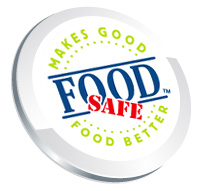Burnaby FOODSAFE Level 1
 Same-day Certification! Students receive official FOODSAFE certificates issued by the local Health Department and recognized throughout BC and beyond. All our courses are taught by local Certified Public Health Inspectors who entertain as they educate with amazing real-life restaurant inspection stories full of the best and worst examples of food handling imaginable. You will learn a lot at our Burnaby FOODSAFE class!
Same-day Certification! Students receive official FOODSAFE certificates issued by the local Health Department and recognized throughout BC and beyond. All our courses are taught by local Certified Public Health Inspectors who entertain as they educate with amazing real-life restaurant inspection stories full of the best and worst examples of food handling imaginable. You will learn a lot at our Burnaby FOODSAFE class!
FOODSAFE Level 1 explains why food poisonings occur and how to prevent them. This is important information for those in the food or care-giving industries, or anyone who values keeping food safe for themselves, their families, or others. It is also a valuable resume addition for anyone whose current or future employment involves handling food. BC’s Food Premises Regulation requires FOODSAFE Level 1 certification wherever food is served to the public.
FOODSAFE Level 1 - Frequently Asked Questions
- What is FOODSAFE Level 1 (Basic) about?
- Who Needs FOODSAFE Level 1?
- Is FOODSAFE difficult?
- Does FOODSAFE Level 1 have an exam?
- Do I receive my certificate the same day?
- Is this the official FOODSAFE Certificate Course?
- Does the FOODSAFE Certificate expire?
- What if English is not my first language?
- What if I don't pass?
1. What is FOODSAFE Level 1 (Basic) about?
Topics covered include:- Introduction to how microbes cause food poisoning
- Safe methods of receiving, storing, cooking, cooling, reheating, cold-holding, hot-holding, thawing, and serving foods
- Personal hygiene
- Cleaning and sanitizing
2. Who Needs FOODSAFE Level 1?
Anyone seeking employment in Food-service, hospitality, and care-giving industries. Most employers in these fields strongly prefer that any new staff have FOODSAFE Certification, and many employers require all their staff be FOODSAFE Certified. Required by law. Provincial law requires that wherever food or beverages are served in B.C., the manager must be FOODSAFE Certified. If the manager is ever absent, at least one other person present must be FOODSAFE Certified. Many employers require many or all of their staff to be FOODSAFE Certified to ensure that this legal requirement is met, and their customers and businesses are protected from food poisoning. Anyone who prepares food. Many people take FOODSAFE simply to ensure the safety of the food they serve in their own homes. Everyone wants to be sure that the food they prepare for themselves, their friends, or their family, is safe to eat. Go to top3. Is FOODSAFE difficult?
Not very difficult, and we help make it easy. Approximately 95% of students taking FOODSAFE with us successfully pass the course on their first try. Our instructors understand that each class consists of students with a wide range of ages, experience, ability and English skills. Many of our students have not been in a classroom for many years, and the vast majority are pleasantly surprised at how well they do. If a student has difficulty passing the FOODSAFE course, the reason is usually limited English Language skills. If English is limited, see “What if English is not my first language?”. Go to top4. Does FOODSAFE Level 1 have an exam?
The last hour of the day is a 50 question multiple-choice test. Students need 70% to pass. Approximately 95% of students taking FOODSAFE with us successfully pass the course on their first try. The multiple-choice test is available in English, Arabic, Chinese, Farsi, French, Japanese, Korean, Punjabi, Spanish, Tagalog, and Vietnamese for those more able to read in those languages (see “What if English is not my first language?”). Go to top5. Do I receive my certificate the same day?
Yes. We mark your exam as soon as you are finished and (upon successful completion) issue a temporary certificate before you leave. This temporary certificate serves to prove that you are FOODSAFE Certified until the official certificate arrives by mail. Go to top6. Is this the official FOODSAFE Certificate Course?
Yes. This is the Certificate course that is required by law wherever food is served to the public within BC. The certificates are issued by the Provincial Health Authority and registered with the British Columbia Centre for Disease Control. Go to top7. Does the FOODSAFE Certificate expire?
Yes. Effective July 29, 2013, all FOODSAFE certificates expire 5 years from the date of issue. Certificates issued before July 29, 2013 expired on July 29, 2018. Go to top8. What if English is not my first language?
We understand the each class will have students who have limited English skills. The most current FOODSAFE student workbook is filled with many images specifically designed to be easily understood by students of all languages. The courses are delivered in clear, easy-to-understand English, at a level understandable by most ESL students. Students can choose student workbooks in English or French, or bilingual workbooks in English + Chinese, Korean, or Punjabi. These bilingual workbooks have proven to be very helpful for the students who use them. The multiple-choice test is available in Arabic, Chinese, Farsi, French, Japanese, Korean, Portugese, Brazillian Portugese, Punjabi, Spanish, Tagalog, and Vietnamese for those more able to read in those languages. Please note that the FOODSAFE Certificate you receive will not indicate the language of your workbook or exam. For those with limited English Language skills or learning difficulties, purchasing the workbook in advance to become familiar with the material prior to the day of the class can be of extra help. Private group classes are also available in Punjabi or Chinese, with Instructors who are fluent in these languages. Go to top9. What if I don't pass?
Students must obtain a mark of at least 70% on the multiple-choice test to pass; approximately 95% of students do pass the course the first time. Students who obtain 60-68% on the test may rewrite the exam one time at a later date free of charge. Students with a mark of below 60% (or who do not pass their one free rewrite) are required to retake the entire course. Go to topFOODSAFE Level 1 Courses in Burnaby, BC
All our Burnaby FOODSAFE classes are held at the British Columbia Institute of Technology at 3700 Willingdon Ave. Please note that our staff is only present at the scheduled class time and room; for registration or information please see the course listings below or email or telephone our Vancouver office at 604-565-3663.
Location Map & Address
Burnaby
Email: info@advance-education.com

